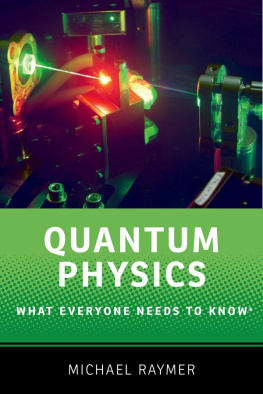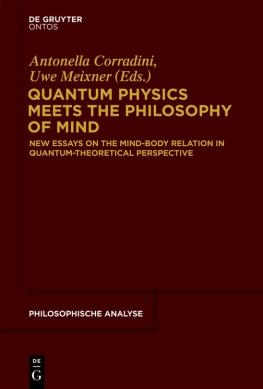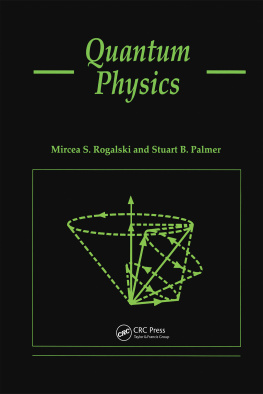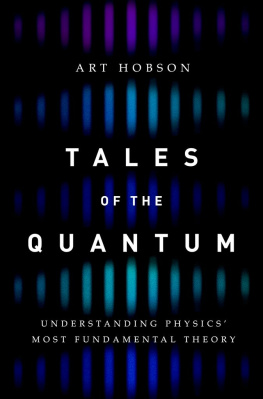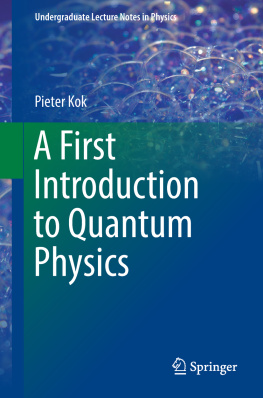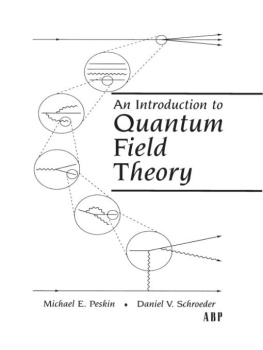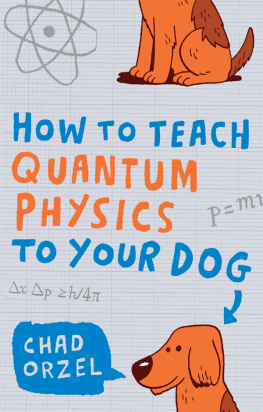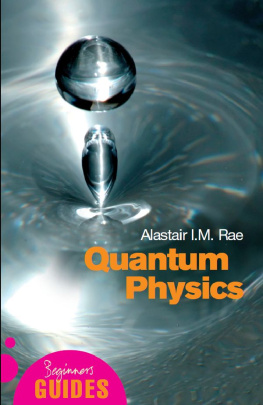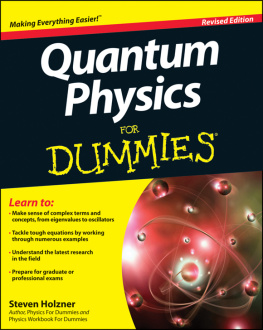Michael G. Raymer - Quantum Physics
Here you can read online Michael G. Raymer - Quantum Physics full text of the book (entire story) in english for free. Download pdf and epub, get meaning, cover and reviews about this ebook. year: 2017, publisher: Oxford University Press, genre: Children. Description of the work, (preface) as well as reviews are available. Best literature library LitArk.com created for fans of good reading and offers a wide selection of genres:
Romance novel
Science fiction
Adventure
Detective
Science
History
Home and family
Prose
Art
Politics
Computer
Non-fiction
Religion
Business
Children
Humor
Choose a favorite category and find really read worthwhile books. Enjoy immersion in the world of imagination, feel the emotions of the characters or learn something new for yourself, make an fascinating discovery.
- Book:Quantum Physics
- Author:
- Publisher:Oxford University Press
- Genre:
- Year:2017
- Rating:5 / 5
- Favourites:Add to favourites
- Your mark:
- 100
- 1
- 2
- 3
- 4
- 5
Quantum Physics: summary, description and annotation
We offer to read an annotation, description, summary or preface (depends on what the author of the book "Quantum Physics" wrote himself). If you haven't found the necessary information about the book — write in the comments, we will try to find it.
Quantum Physics — read online for free the complete book (whole text) full work
Below is the text of the book, divided by pages. System saving the place of the last page read, allows you to conveniently read the book "Quantum Physics" online for free, without having to search again every time where you left off. Put a bookmark, and you can go to the page where you finished reading at any time.
Font size:
Interval:
Bookmark:

Oxford University Press is a department of the University of Oxford. It furthers the Universitys objective of excellence in research, scholarship, and education by publishing worldwide. Oxford is a registered trade mark of Oxford University Press in the UK and certain other countries.
Published in the United States of America by Oxford University Press
198 Madison Avenue, New York, NY 10016, United States of America.
Oxford University Press 2017
All rights reserved. No part of this publication may be reproduced, stored in a retrieval system, or transmitted, in any form or by any means, without the prior permission in writing of Oxford University Press, or as expressly permitted by law, by license, or under terms agreed with the appropriate reproduction rights organization. Inquiries concerning reproduction outside the scope of the above should be sent to the Rights Department, Oxford University Press, at the address above.
You must not circulate this work in any other form and you must impose this same condition on any acquirer.
Library of Congress Cataloging-in-Publication Data
Data Names: Raymer, Michael G., author.
Title: Quantum physics: what everyone needs to know / Michael G. Raymer.
Description: New York, NY : Oxford University Press, [2017] | Includes bibliographical references and index.
Identifiers: LCCN 2016050787| ISBN 9780190250713 | ISBN 0190250712 | eISBN 9780190250737
Subjects: LCSH: Quantum theory.
Classification: LCC QC174.12 .R387 2017 | DDC 530.12dc23 LC record available at https://lccn.loc.gov/2016050787
To Kathie
This book explains to nonscientists what quantum physics is all about and the new technologies currently being developed based on the uniquely quantum behaviors of light and matter. It aims to answer in this context, the question, What does everyone need to know about quantum physics? My view, as a scientist working in quantum physics, is that a book for everyone shouldnt try to explain everything. Quantum physics is far too broad a subject. Instead, I asked myself, what is the one idea that is most significant about quantum physics that everyone can understand? To many physicists, the most significant aspect of quantum physics is the way it causes us to reexamine our deepest underlying concepts of the physical worldthat is, our scientific worldview.
Quantum physics recognizes that the world behaves probabilistically, and does so in a way that clashes with our everyday perceptions. This idea contains two main points. First, the physical world does not behave like clockwork; knowing the current state of affairs as perfectly as possible does not ensure we can predict precisely the future state of affairs. Future events are not predetermined. We can talk meaningfully only about more or less probable futures. Likewise, observing the current state of affairs as perfectly as possible does not tell us exactly the previous state of affairs. While it might not be surprising that its impossible to predict exactly the behavior of complex systems such as a human, the study of quantum physics shows this is true even for the simplest possible objects, such as a single electron.
Second, consider that when we observe a previously hidden object for the first time, our everyday perceptions are that its appearance and behavior at that moment are direct indications of how they were just before observing them. If you open a gift package and observe a green jewel, you naturally assume it was green before you opened the package. Such an intuitive worldview breaks down at the quantum level when one observes the properties and behaviors of elementary objects such as electrons.
Although you might at first think it is not so odd that intuition breaks down when observing the properties and behaviors of such small objects, most physicists believe the more deeply you think about this fact, the odder it becomes. Nobel Prizewinning physicist Murray Gell-Mann said:
The discovery of quantum mechanics is one of the greatest achievements of the human race, but it is also one of the most difficult for the human mind to grasp. It violates our intuitionor rather, our intuition has been built up in a way that ignores quantum-mechanical behavior. (Gell-Mann, The Quark and the Jaguar: Adventures in the Simple and the Complex [New York: W.H. Freeman, 1994, 123])
A main goal of this book is to help you think about and understand the situation deeply enough so you can appreciate just how counterintuitive the quantum physics worldview is, which has been confirmed time and time again by laboratory experiments. In fact, in 2015, as I was writing this book, separate experiments were carried out in three different laboratories providing the strongest evidence ever that the world in which we live is truly incompatible with any explanation based on an intuitive, classical physics worldview. The classical physics worldview, which now seems to be untenable, presumes that each elementary object has definite properties and predetermined behaviors independent of how or if they are observed. Science magazine named this accomplishment as one of the Top Ten results in all of science for the year. As a result of these and many previous experiments, which are explored in this book, our scientific worldview has changed forever.
A changing scientific worldview often goes hand in hand with a technological revolution, with the two reinforcing each other in a discoveryinnovation feedback loop: agriculture and the advent of human specialization, the printing press and the spread of literacy, eighteenth-century physics and the industrialization of production, the computer and the advent of online social media, and so on. Today, after one hundred years of studying quantum physics, a new breed of technology is arising: quantum technology. The new technology is birthed from a newfound understanding of how the world works. Although it works in counterintuitive ways, scientists and engineers can harness these quantum phenomena to accomplish new kinds of tasks: unbreakable message encryption, ultraprecise sensors of gravity and of acceleration, computers that can compute answers to problems exponentially faster than any computer built to date.
My goal is that a curious, persistent reader with no background in physics will be able to follow the evidence and logic used to explain why we believe quantum theory to be correct, as far as it goes, and how it can be put to good practical uses.
Most important, I thank Kathie Lindlan, my wife, who lovingly encouraged and supported the writing of this book. I also thank my father, Gordon Raymer, for reading the manuscript and offering excellent technical and stylistic suggestions.
I want to acknowledge and thank those others who were most instrumental in the creation of this book. I thank physicists Mark Beck, Steven van Enk, and Dennis Hall for constructive comments on portions of the text. And, besides the many other physics friends and colleagues from whom I have learned over the years (you know who you are), I especially thank two young physicists: Chris Jackson and Dileep Reddy. Together, we developed and taught a course at the University of Oregon on quantum physics for students who were not intending to become scientists (although some decided to be!). The goal of the course was to distill the big ideas of the subject into concepts that can be described without using mathematics. In addition, Chris commented on some early drafts of this book and aided me in developing some of the language used to express the concepts of quantum science to a general audience. Im grateful for Chriss and Dileeps helpful insights and enthusiasm. Of course, if there are any errors in the presentation, I claim them as my own.
Font size:
Interval:
Bookmark:
Similar books «Quantum Physics»
Look at similar books to Quantum Physics. We have selected literature similar in name and meaning in the hope of providing readers with more options to find new, interesting, not yet read works.
Discussion, reviews of the book Quantum Physics and just readers' own opinions. Leave your comments, write what you think about the work, its meaning or the main characters. Specify what exactly you liked and what you didn't like, and why you think so.

